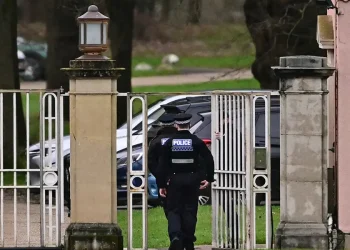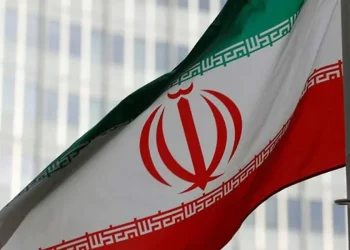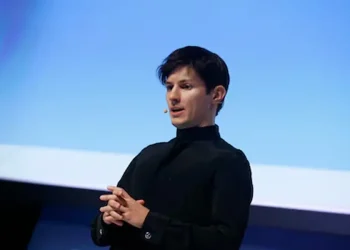BUENOS AIRES, Argentina (news agencies) — Campaigning last year as a libertarian outsider, Javier Milei electrified rallies with his vows to destroy Argentina’s corrupt political elite. But the eccentric economist-turned-president now faces accusations of hypocrisy over his Supreme Court nomination.
What makes his choice of Ariel Lijo, 55, so extraordinary is not just the judge’s lack of appellate experience or scant scholarly publications, but that he has been accused of conspiracy, money laundering and illicit enrichment, and has come under scrutiny for more ethics violations than almost any other judge in his court’s history.
“This is a massive regression, an effort to undermine the judiciary and the fight against corruption,” said Juan Pappier, deputy director of the Americas at Human Rights Watch. “This is Milei’s biggest contradiction.”
The backlash to Lijo’s May 28 nomination was swift. Protestors rallied outside the Supreme Court. Legal watchdogs, business groups and newspapers castigated Milei for elevating an exemplar of the class that he had vowed to disrupt.
But Lijo has allies across the political spectrum, and Milei predicts an easy confirmation, even though the president’s political isolation has frustrated his efforts to get a single bill passed in six months. After an explosion of violent protests, Milei’s radical state overhaul, a 232-article bill that grants the president enlarged powers over the economy, squeaked through the Senate last week.
“Lijo is special in that he can get the votes,” said Alberto Garay, president of the Buenos Aires Bar Association. “It’s not about getting respected jurists in the court, it’s about friends.”
An aide to Lijo told media that the judge would not speak to reporters until after his Senate confirmation hearing, expected in the coming weeks.
As soon as he took office, Milei — who raffled his monthly salary as a lawmaker — launched what he labeled a shock economic adjustment to address Argentina’s failing finances, but its success hangs on a wave of court challenges.
Without allies in Congress, the president relied on a controversial emergency decree to deregulate the labor market. Judges suspended major sections of the measure after unions complained it was unconstitutional. Milei argues that as annual inflation nears 300%, Argentina’s economic crisis constitutes an emergency that justifies the sweeping decree under Argentina’s constitution. Lawyers disagree.
“Every constitutional democracy is based on the notion of limited executive power,” said Ricardo Gil Lavedra, a constitutional lawyer and former justice minister. “If Milei can get the judges he wants through the Senate, he’ll have a court that won’t unravel his reforms.”
Milei says that Lijo’s investigations into top officials have shown his anti-corruption credentials. But otherwise, his tepid defense of Lijo against the fusillade of attacks has done little to quell speculation.
Asked by a Buenos Aires radio station why Lijo was a good choice, Milei paused before saying, “There is a relative advantage in that Lijo knows how the justice system works.”
Even Milei’s allies have fought back. Libertarian economist Alberto Benegas Lynch, Milei’s intellectual mentor, said he is “alarmed.” Vice President Victoria Villarruel expressed disappointment.
The Argentine-American Chamber of Commerce warned the nomination could damage Milei’s efforts to secure international investment.
Lijo is beset with accusations of misconduct.
Perhaps most unnerving, critics say, is a 2018 criminal case accusing Lijo and his millionaire brother, Alfredo, of conspiring to perform official favors for wealthy businessmen in exchange for money and shell companies. Prosecutors accused them of amassing a fortune by disrupting judicial proceedings against tycoons and officials.
Argentina’s anti-money laundering agency investigated the brothers’ business associations and properties, saying their “inexplicable increase in assets” raised suspicions. But in 2021, with investigations in full swing, the case was dropped for lack of evidence at the request of Mariano Cúneo Libarona, Lijo’s then-lawyer, who is now Argentina’s justice minister.
For years, political commentators have joked about Lijo’s talent for throwing out sensitive corruption cases against powerful officials, dubbing him the “court anesthesiologist.” Legal experts say his record of shelved cases epitomizes what is wrong with sluggish judiciaries regionwide.
“We see a pattern in autocracies all over Latin America, where the first thing that leaders do is undermine the independence and integrity of the judiciary,” said María Eugenia Talerico, the former deputy director of the Financial Investigations Unit. “To protect democracy, you need trained, honest and sound judges.”
Since its formation in 1999, the magistrates council, Argentina’s top judicial watchdog, has encountered just two Buenos Aires federal judges dogged by more complaints of misconduct than Lijo, who has faced 32 formal denunciations in his 20-year career, Argentina’s Civic Association for Equality and Justice (ACIJ) found. In the past year, Lijo has faced five impeachment requests, unrivaled in his court.










 American Dollar Exchange Rate
American Dollar Exchange Rate